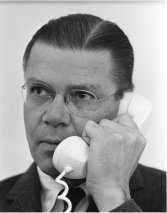May 2003
Trust...in the Wind
By Michael J. Katin, MD
"We of the Kennedy and Johnson administrations who participated in the decisions on Vietnam acted in accordance with what we thought were the principles and traditions of this nation. We made our decisions in light of those values. Yet we were wrong, terribly wrong. We owe it to future generations to explain why." -- Robert McNamara, In Retrospect
Trust is a valuable commodity at all times, especially now, when cynicism is rampant and conspiracy theories are running wild. Probably many polls would show that more people believe that Iraq's weapons of mass destruction are being hidden in EuroDisney than believe that the budget can be balanced by having tax cuts rather than increases (similar to steering in the direction of the skid).
This being the case it is comforting to know that the field of oncology has tended to be a bastion of credibility, as long as you forget that hundreds of people spent thousands of hours trying to document the value of misonidazole.
"I say to you here, as Minister of Health, that the epidemic has come under effective control. It is safe to work, tour, or live in China." -- Chinese Health Minister Zhang Wenkang, April 4, 2003. He was fired April 20.
Maybe he was talking about West Nile virus; obviously SARS was a concept foreign to him. With all this subterfuge going on in the world, it is critical for the field of medicine to stay as pure as possible. Since some publications also suffer from SARS (seldom accurate renderings of science), maybe this is easier imagined than done.
I won't presume to speak about other specialties, but in the reporting of radiation oncology alone there are can easily be found three recent examples of fluctuations in the truth.
The first example is from a popular magazine, which will remain unidentified, which is published in Pleasantville, New York, and can be found at supermarket check-out aisles. No, not National Review. In the May issue there's a section on "new cures" for breast cancer, describing radiofrequency ablation, sentinel node biopsy technique, brachytherapy, and anastrozole. None of these is particularly new, but it would be nice if the article didn't have the obligatory negative reference to radiation therapy. The adjective "grueling" is used not once, but twice, describing the "grueling marathon" and the "grueling six-week regimen" as well as the "typical pain and fatigue." "Tedious," yes, "stressful," yes, but "grueling" may be overdoing it, especially twice on the same page, and I'm not sure what the "typical pain" is supposed to be. Ironically, this magazine "typically" has a monthly feature on "Word Power," devoted to the accurate definition of words.
The second example is from another publication from New York, the New York Txxxx, with an article on April 29 announcing that "Brain Surgery, Without Knife and Blood, Gains Favor." Why exactly this is news in April, 2003, is unclear, but it describes a patient treated for a tumor that had grown to "nearly the size of a Ping-Pong ball." There is more than a half page extolling the wonders of stereotactic radiosurgery, which has already been in use in nearly every community for over 10 years. I checked to make sure there wasn't another article in this section discovering the existence of personal computers or CD players or indoor plumbing. The scientific accuracy of the radiosurgery article, however, is called into question when it then downplays the use of this technique versus craniotomy, stating that it "cannot be used to treat tumors larger than three centimeters." The updated September 1, 2002, official rules of Table Tennis clearly state, "The ball shall be spherical, with a diameter of 40 mm." So much for internal consistency.
The third example is less disconcerting, except that it incriminates the IJROBP, commonly known as the Red Journal to most and as the Green Journal to those with trichromacy. It recently published papers from the Third S. Takahashi Memorial Workshop on 3-Dimensional Conformal Radiotherapy. This included "Rotational 3D- Conformal Radiation Therapy Combined with Hormone Therapy for the Treatment of Stage B2/C Prostate Cancer in Japanese Men" and "High Dose-Rate Brachytherapy as Monotherapy for Localized Prostate Cancer: A Retrospective Analysis With Special Focus on Tolerance and Chronic Toxicity". These are worthy articles, but in desperate need of commentary by Dr. Bob Arnot, NBC's medical correspondent, who in 2000 published the Prostate Cancer Prevention Plan, the premise of which was the Asian diet could prevent prostate cancer. In that case, why did any Japanese men require treatment for this disease?
I think the only solution is to set up an independent arbiter to help resolve these paradoxes in medically-related publications, especially radiation oncology (since we really don't care about the other specialties), to coach the writers of scientific articles and to make sure that the facts are presented as accurately and truthfully as possible. I think we all know the person who is not only immediately available but already trained for this mission.
email: mkatin@radiotherapy.com
